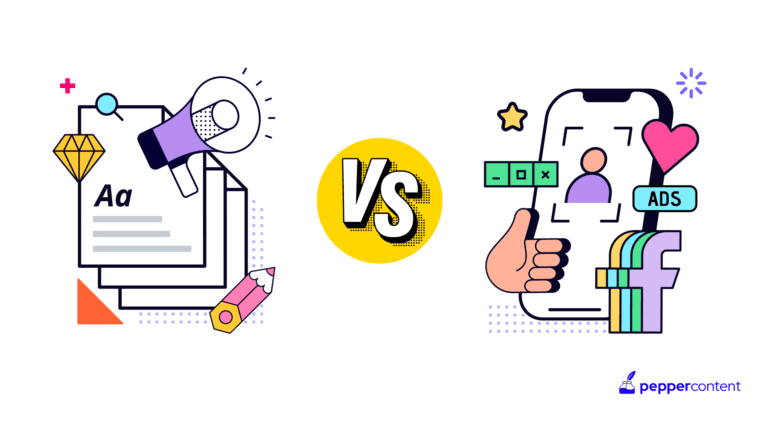Creating Result-Focused Content Strategy With Content Matrix

If you have recently ventured into content marketing and writing, you will begin to understand that there is so much that goes into making great content. Behind the scenes, a content marketer or content strategist will be the one making several critical decisions like:
● What type of content should be created?
● How will this content be used, distributed, and amplified?
● What should be the voice of the content?
● What is the purpose of the content?
● What are the target audience’s preferences?
Most marketing teams use a content matrix to help content marketers, strategists, editors, and marketing professionals craft the ideal content strategy.
The content matrix or a visual scatter plot helps brands easily understand audience perception and purpose to help craft and distribute content in line with the brand’s marketing goals. In this blog, we will look at a content matrix and how marketers use it.
What Is a Content Matrix?
A content matrix is a visual tool that allows marketers to assess and organize their content according to their audience’s preferences. The matrix breaks down the content strategy into a two-dimensional scatter plot.
- The first axis plots where the conversion process of the content falls. It starts from the initial awareness stage and goes to the final stage, i.e., conversion.
- The second axis plots the intention behind the content. So, on one side, you have engaging, entertaining, or emotional content, while on the other, you have entirely rational content.

These two-axis put together constitute the content matrix tool in which marketers will plot their strategies. These are broken down into different areas: Entertain, Inspire, Educate, and Convince/Enlighten.

The content matrix enables brands to plot their strategy and highlight strengths, locate weak spots and make the right decision based on proper reasoning.
Tips to Create a Result-Focused Content Marketing Strategy With Content Matrix
A content matrix helps brands plot all their content assets and strategies in a simple and easy-to-comprehend scatter map. Hence, brands can make critical decisions for their content and even realign their strategy to focus on the proper distribution channels, content formats, and customer journey. Using the content matrix, brands can create a result-focused content strategy by:
1. Making the content matrix central to all content types
The content matrix enables brands to plot exactly each content format based on their purpose and role in the customer journey. This enables them to understand how each content type is being used in the customer journey and its effect on the customer.
2. Auditing existing content and its purpose in the marketing strategy
The content matrix ensures that their content strategy is crafted based on a sound understanding of where the content will be used.
For example, most brands will use blogs in multiple customer stages like awareness, consideration, and conversion. However, since the content matrix requires all content types to be plotted in one central strategic map, brands can now leverage blogs for the right purpose.
So, while general blogs or articles are used to entertain or educate the audience in the awareness stage, a how-to blog or thought-leadership blog will be used in the inspire and convince matrix (with the objective to convince).
3. Finding weak spots in your conversion process
The content matrix also helps brands understand weak spots or gaps in their customer journey and pinpoint the exact content format and strategy required to optimize conversion. For example, if a brand is doing a great job gaining new leads but experiencing a gap in conversion, brands can identify where they should focus their energies.
4. Visualizing the content types in building a long-term goal
Brands can also use the content matrix for understanding their long-term vision, which can sometimes be out of line with the brand’s core purpose. Most brands want to create viral content, hence focusing their energies on entertaining and emotional content.
However, suppose the brand’s long-term goal is to maximize conversions and focus on revenue generation; in that case, their content needs to instead focus its energies on creating content that convinces the audience to buy their product or service.
5. Matching the suitable content format for the intended purpose
In addition to knowing how each content type enables the brand to optimize their customer journey, brands can also take the right steps to match their content format with the intended purpose.

For example, if the goal is to generate awareness, brands need to craft educational, entertaining content that appeals to a larger group. However, if the objective is to convince and convert, the content needs a niche and focused approach, appealing to a specific target customer.
How to Create a Content Matrix?

Here is a quick look at how a content matrix works. We recommend using a content matrix tool that has the four quadrants marked and adding scatter plots based on three key decisions:
1. Who is your target audience?
Craft a buyer persona for each customer segment, and ensure these are represented correctly in your content matrix.
2. What does your customer journey look like?
Define your customer stages and the customer’s actions to move from one stage to the next.
3. What are the content assets that you will be creating?
Design the content matrix by thoughtfully aligning each content type based on the marketing goal and where it needs to be placed.
You can also get a detailed step-by-step approach to building a content matrix tool here.
Additionally, Ninety Black’s content matrix example below showcases multiple content types broken down into four quadrants. Similarly, you can use it in your own content planning and plan your content distribution and marketing approach accordingly.

Conclusion
A content matrix doesn’t just guide and regulate the content strategy but also helps plan, create and disseminate content to prospects in effective and engaging ways. With this powerful tool, in no time, marketers can achieve their desired results, create a result-focused content marketing strategy, and rejoice with the team.
FAQs
The content matrix or a visual scatter plot helps brands easily understand audience perception and purpose to help craft and distribute content in line with the brand’s marketing goals.
The content marketing matrix has all your content assets distributed among the four quadrants, based on three key decisions:
● Who is your target audience?
● What does your customer journey look like?
● What are the content assets that you will be creating?
The end goal of any marketing process is to generate awareness and conversions. The entire process of buying and selling revolves around the customer’s needs.
Hence, marketers should first understand and define their buyer’s persona to better understand who their audience is, leveraging it as the core for their content matrix.
Latest Blogs
In this blog, explore the golden rules of using AI marketing tools so you can leverage the benefits to their maximum potential.
In this blog, you’ll learn how to avoid the pitfalls of SEO over-optimization while enhancing your site’s performance.
In this article, we’ll take a look at what AMP is, its advantages and disadvantages, and how it affects SEO.
Get your hands on the latest news!
Similar Posts

Content
9 mins read
Content Marketing vs Advertising – Which One is More Effective?

Content
11 mins read
Interactive Content vs. Static Content: Which is More Effective?

Content
6 mins read